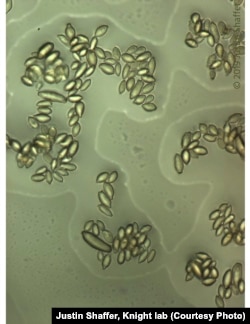By Elizabeth Lee/VOA News
SAN DIEGO — New discoveries about what is inside the body are making scientists rethink what makes a person human and what makes people sick or healthy.
Less than half of the cells in the body are human. The rest belong to microorganisms that affect the health, mood and whether certain people respond better to certain medications.
“So to our 30 trillion human cells, we have on average about 39 trillion microbial cells. So by that measure, we’re only about 43% human,” said Rob Knight, director of the University of California San Diego Center for Microbiome Innovation and professor of pediatrics and computer science and engineering.
Microbes affecting health
It is common knowledge that bacteria, or even viruses and fungi, exist in areas of our body, including the mouth, skin and gut. However, it is only in recent years that scientists have discovered that each person’s gut bacteria is unique, and the collection of microbes can greatly impact a person’s health — such as their weight and whether they will develop ailments such as heart disease.
Microbes in the gut can even affect mood. Researchers are studying whether conditions such as autism, multiple sclerosis and Parkinson’s disease are linked to microbes.
“They changed the way we think about biology, and changed the way we think about what it means to be human,” Knight said.
The collection of microbes in each person is different, starting from when babies are born. How they enter the world, whether vaginally or through cesarean section (C-section), whether they drink breast milk or not, the animals they are exposed to and the medications they take, can all impact their development.
“The biggest problem with antibiotics is early in childhood, and especially the combination of C-section and antibiotics and bottle feeding is especially bad for kids. We’ll see impacts on that even at age 8 to 12, in terms of their weight, even in terms of the cognitive performance,” Knight said.
The cancer puzzle
Karen Sfanos, associate professor of pathology, oncology and urology at the Johns Hopkins University School of Medicine, said researchers think at least 70% of a human body’s immunity and immune cells exist in the gut.
She is studying the link between microbes and cancer.
“There’s still many cancers out there where we have no idea what even causes the cancer. We’ve been trying to solve this puzzle, and up until this point, half the pieces were missing because we didn’t even know half the pieces existed. There’s just a tremendous amount of knowledge that’s to be gained and to be researched to understand the profound influence that these microbes might have on both cancer initiation but also therapeutic response to certain cancer therapies,” she said.
What affects microbes in an adult body most is diet and how many different types of plants a person eats.
“By eating a high-fat diet or an unhealthy diet, (it) can lead to pro-inflammatory microbes. It can cause inflammation in the gut, in your GI tract, and, unfortunately, in that scenario, the inflammation that happens in your gut can have a really long-distance effect on many other organ systems in your body,” Sfanos said.
One company, DayTwo, is using the findings of gut microbe research to fight diabetes.
“The diversity and abundance of the bacteria in the gut are a very useful predictor in how people process food,” said Josh Stevens, president of DayTwo.
Since each person’s gut bacteria is different, how a body reacts to sugar is also different for each person.
“So by profiling the gut, we can actually help people get to a personalized prescription for food that works for them,” Stevens said.
Distinguishing the good from the bad
Microbes in the body are changing every day. A growing number of scientists are researching these microbes to learn which ones are good and bad. They are seeing promising results in treating a hospital-acquired infection called C. diff.
“You can treat C. diff by taking a stool from a healthy person and giving it to a sick person. And they typically recover in two or three days. And it has about (a) 90% cure rate, as opposed to 30% for antibiotics,” Knight said. This process is done by mixing a fecal sample from a healthy person into a liquid preparation and introducing it to a sick person via a feeding tube or colonoscopy.
Researchers are working toward a future where there is a more precise approach to weeding out the bad bacteria and introducing more good microbes into the body to improve health.


